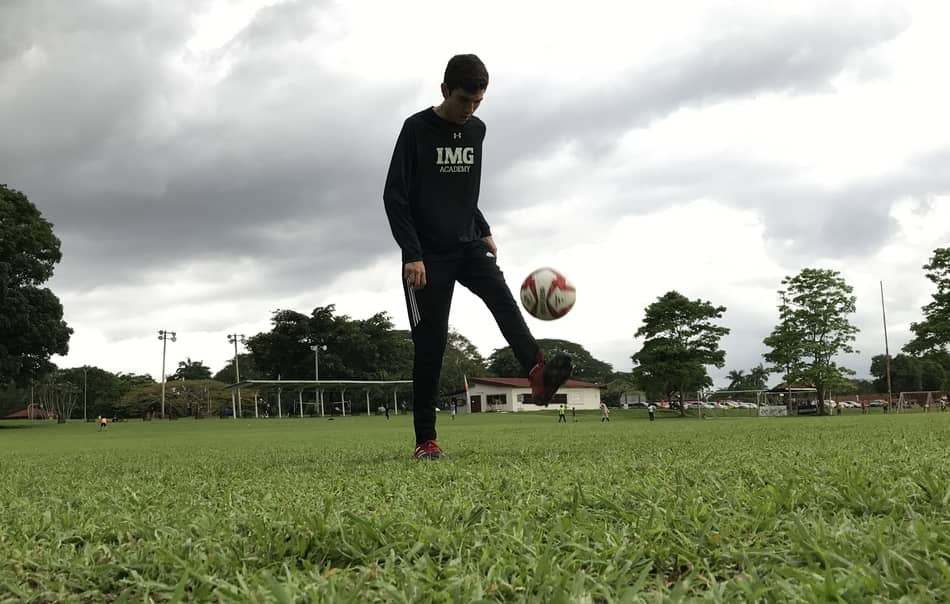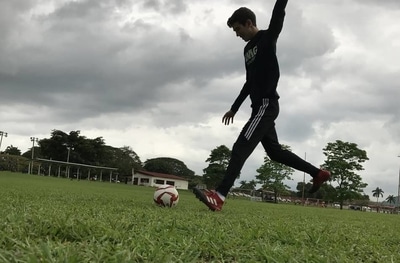
Being called a team captain is a big responsibility. It is an honor to be one, as you represent all your teammates, fans, and all people inside and outside the field. If you want to be a team captain just to brag about it, use the captain’s band and call a coin toss, then I guarantee you will never be captain.
The only captain in a soccer team is not the one that has the captain’s band. You can also be a team leader without being named as the “team captain”. If you truly want to be a good team leader, the last thing you will want to do is doing it because you want to be named captain. Instead, do it because you truly want to help the team out.
If you’ve ever heard that people are born being good leaders, you don’t have to believe that is 100% true. It is true that some people are naturally less shy and carry the team a lot more than others, but absolutely everyone can do something to become a good leader in the field.
#1: Lead by example
The #1 rule of every respectable leader is: If you want people to do things in a specific way, then you should do it that way too. A good leader doesn’t tell the team to make a sacrifice to run down the field to help on defense when he doesn’t do it.
There a couple of logic reasons why every leader should lead by example:
- Makes teammates see you with respect. If you always tell everyone what to do, but you don’t do it, then automatically people will not see you as a respectable character, instead they will start seeing you as a joke.
- When leading by example, you inspire your team to do the same as you. They see you as someone they are willing to follow.
- The team spirit increases. The purpose of every good soccer team captain is to maintain the team together. If the team leaders don’t lead by example, the bonds between the players of the team star to weaken. In the 0ther hand, when a leader leads by example, he let’s know everybody that we are all working together as a team to achieve that common goal: win the game.
#2: Communicate effectively
It may sound dumb, but communicating effectively is something not easy at all to achieve. In a soccer game, you don’t have the time to talk too much, you need to be brief and concise in the things you want to say. The shorter the message the better.
However, that short message needs to communicate effectively what you want. I know, it sounds hard, but this is what differs real leaders from other players.
A good example could be this one: You are the central defender of your team. Your team’s right back is playing too close to the middle leaving his wing open. Therefore, the opponents are penetrating too much through his wing.
A normal person would say: “You’re playing too close to me, they are penetrating too much in your side because you are leaving too much space for them. Play a little wider to cover your wing.”
As you can see, the phrase is too long, probably when he finishes saying it, the team has already conceded a goal through his wing.
A good leader might say: “Be careful! Watch your wing, play a little wider. Lets do this man!”
As you can see, both phrases say the same thing, but one is more effective to communicate the message than the other.
#3: Always encourage teammates
A great team captain doesn’t criticize his teammates when they mess up, he recognizes that he isn’t perfect either and encourages them to move forward. If your teammate messes up in one play, the worst thing you can do is going and shout to him saying something rude. The only thing you’ll do is make that person play scared, which will make him mess up more and more, not being able to concentrate correctly.
Instead of shouting at them, say something like: “Come on man, concentrate and the next one will be yours.” In this way your teammates will feel more confident as if someone is there to back them up, making them to play better.
However, if you see that they are consistently messing it up every single play (about 3-4 times), then it would be nice to make a call of attention so they react, and get back in the game again.
Soccer teams is all about encouragement among one another. Practice it and your teammates will start seeing you as a leader, as someone they can rely on and that trusts them.
#4: Create strong relationships
In a good team, players are not only teammates, they are friends, and brothers. There is a huge different between playing with someone you just met a couple of hours ago, and playing with friend; a partner. Friends already know each other and have a great chemistry and trust when playing in the same team.
If you want to be a great captain you need to build a strong relationship with each one of your teammates. You need to be the person all your teammates trust the most. Be someone everyone in the team can rely on, and this is done not by someone they only know, but by having a good relationship with everyone.
Here are a couple of things you can do to start building strong relationships with each of your teammates:
- Outside of the field, organize an activity where teammates can interact with each other. It can be a BBQ at your house, maybe a dinner, a walk in the mall, etc. In this way you are not seen only as someone they play soccer with, instead they start seeing you as something more.
- Take care of them. Make them feel as you really do care if they are alright. A simple conversation like: How’s your day going? Everything alright buddy? How are you feeling? Do you need help for anything? All are examples of things you can say to make them start trusting you.
- Identify the opportunities you have to build relationships. A great example can be this: Imagine one of your teammates was injured during a match. After the match you can call him to ask how he is, to know how much time he’ll need to recover, and to wish him a fast recovery. These little details are the ones that matter the most.
If you try to apply these to real life, you’ll see that people will not only trust you more, they will also respect and love you more (in a good way). Two factors that are important for every team leader.
#5: Pay attention to your teammates
No one knows what is happening inside each ones head. Everyone lives a different life. Maybe our lives could be great right now, but maybe one of our teammates might be having a bad time. I can tell by own experience that I’ve seen players from my team playing horrifically bad, when they are very good players.
You never know what might be happening inside his head. Maybe the reason why they are playing so bad is because of something outside of soccer. If you want to be a good leader, take care of your teammates when they are feeling bad. A little detail like asking: “Are you okay?” or “Is everything alright friend?” Can help a lot that person.
You will be seen as someone that really cares about the others; very empathic. This is another way you build strong relationships with teammates and earn the respect of everyone.
#6: Don’t try too hard
Have you ever met someone in a team that desperately wants to be the captain? He tries to show everyone how great he is, and basically tries to force everyone to respect and obey him. Well, let me tell you this is not the way to do it. Respect is not something that is given to you, it’s something you must earn and work for it.
If you want to be the team captain “JUST DON’T TRY TOO HARD”. Do not show everyone that you are desperate to be the captain. If they realize, they will start taking you as joke (which is the opposite to earn their respect).
It’s like a relationship with a girl you like. You can’t force her to love you. You just have to keep trying, and if someday things go well then great, if not, then it’s okay, you move on. Try to become the leader, if someday you are given the captain’s band, then great, if not then it’s okay. You can still be a leader without it.
#7: Confident and humble
Every team leader needs to be confident of himself. I have never met a captain that isn’t confident about himself and what he does. You are supposed to transmit that confidence to your teammates, and make them feel completely sure of themselves. If you are not sure of yourself, then how can you make others be?
I think body language plays a HUGE role in your level of confidence. Just by changing your posture from shrunken to wide and big you will feel a lot different. The way you position your body plays an important part in the way you feel. Also, you need to make sure that both, your teammates and opponents realize that you are confident of yourself.
If a leader demonstrates to his teammates that he feels confident, they will too. In the other, if the team demonstrates the other opposing team they are confident, maybe the other team can shrunken a feel a little intimidated.
A great team leader is also humble. Leaders don’t say “How great I am”, instead they say “how great WE are”. Always keep your head in the clouds and your feet in the ground. Arrogance is not something that characterizes a leader, humbleness is. You work for each other, for what is good for everyone, not only for yourself.

#8: Don’t be shy
Team captains are not shy, they are totally the opposite. I can tell this by own experience: I know that at the beginning, when you enter a new team, it may be hard to talk with everyone and you may feel a little shy. However, when time keeps going and you start to play with them, that shyness will go away and you can slowly begin being a team leader.
The best thing you can do is to show confident and secure to everyone since the very beginning. Shyness may prevent you from being that way, but remember that you can show confidence just by changing your body language. Try to be friendly and get to know everyone step by step.
#9: Get in a rhythm
When I say to get in a rhythm I refer to a soccer a game rhythm. Once you start making a couple of good touches, and gain more confidence, you get in a rhythm and feel totally different. Let me explain what I am trying to say with this short anecdote:
I started playing for a new team. Like always, at the very beginning I was very shy. We played about 4 games, and I was starting to gain more confidence, but not as much to try to become a team leader so soon. I enter as a substitution where we were loosing 2-0 and had red card (playing with ten). When I got in, somehow, I played the game of my life, we scored two goals and got the referee to show 2 red cards to the other team (now they played with nine).
I was in such a great rhythm that I totally forgot that I was a newbie in the team and started acting like a leader, even though I was the youngest of the team. I remember calling my teammates: “Come on everyone! Let’s calm down.” , and “Focus, we have to play smart”. Once you get in rhythm, you are motivated and will start acting like a leader.
#10: Be cold blooded and different
What differs a captain from another player is that the captain’s mind is always serene, calmed. When everyone wants to fight, you have to be the one that is calmed and recognize that is not the best solution. In the other hand, when something wrong happened, either a referee made a bad call or an opponent attacked one of your teammates, it is then when you have to go and make them show a little respect, without loosing your head. Always be cold blooded in the hottest moments.
#11: Motivate everyone when nobody else does
The title says everything. Leaders are the spirit of the team. When the team is passing a hard moment, you need to be the one that keeps the energy to the top and stay motivated. If the team received a goal in the last 10 minutes, and nobody sees any hope of winning the game, the team captain should be the one that motivates everyone and makes them know it is still possible.
#12: Call by name
This is one of the biggest secrets no one ever talks about. It makes a MASSIVE difference calling someone by name, than saying “hey you”. When calling by name you create more engagement with the person, which makes the message communicate more effectively. If you want to be a good leader, you must always ask the name of the people and try to remember it.
#13: Always be positive
Not only in the field or at a game. Absolutely always. Positive people live more years, have more money, are happier, and have a better life overall. No matter if you are loosing 10-0, always be positive that things will get better.
Remember the UEFA Champions League Final between AC Milan and Liverpool back in 2005. Liverpool were loosing 3-0 and they came back to tie the game and win in penalties. They stayed positive all game long and things turned out great for them.
Can you tell me one reason you shouldn’t be positive? I can’t find one.
#14: Treat the referee respectfully
One characteristic of captains is that “technically” they are the only ones allowed to talk with the referee (but that is never the case). However, we could say that, as a captain, you are responsible to communicate the whole team’s concerns over a situation.
One great tip is to always try to defend the referee. Put him on your side. Referees like to feel protected and respected. The last thing a captain should do is loose the composure and shout to the ref. Always communicate with him respectfully, and when possible, put yourself on his side.
#15: Coaching on the field
You can’t play football without speaking once they said. Well, it is very true. Coaches are not on the field, and they can’t communicate the tactics, and ideas of playing effectively from the sideline. It is very helpful to have a great leader inside the field that helps remember the team what is the playing style and the instructions given by the coach in the practice.
This is why most of the times, the team captains are the central defenders, central midfielders or goalkeepers. Because they have a better vision of the whole field and are able to organize the team from a better position than what a winger could do.
#16: Defend teammates
Remember when I said to take care of your teammates? When someone does something to your teammates you have to be the first one to go and defend them. Opponents need to know that they have to be respectful to every single member of the team.
Also, when you defend your teammates, you build a lot of trust among one another. They feel like they have someone they can rely on that will always have their back. That is one of the best feeling you can have as a player: Knowing that your team is like a family that is always there to protect you.
#17: Make opponents respect you
They have to know who is the man in charge. This is done by doing all the things I mentioned above: Defending your teammates, respecting the referee, etc. If an opponent comes shouting at you, the referee, or any other teammate you must be strong and overawe. The team’s spirit relies on you.
#18: Don’t try too hard since the beginning
The worst thing you can do, when you get to a new team, is talking to much since the very beginning. If you are new and you are trying to be a leader immediately, the other teammates will start seeing you as a threat to them or a trash talker, which is not something positive.
Instead try to be friendly at the very beginning, get to know everyone very well, and after some time you’ll be confident enough to know it is a good time to start being a leader. Just don’t hesitate to earn everyone’s respect and trust too soon.

